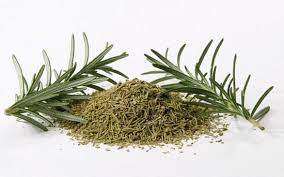
DESCRIPTION
Product: Organic Rosemary
Latin Name: Rosmarinus officinalis
Plant Family: Lamiaceae
Other Names: Compass Weed, Dew of the Sea, Elf Leaf, Sea Dew, Roses of Mary, Incensier, Polar Plant, Old Man, Romero, Romarin, Rosmarin, Rosmarino, Rozumari, Lá Hương Thảo & Iklil al-Jabal.
Description: Rosemary is an evergreen shrubby herb, native to the Mediterranean which grows to a height of 2 metres. The needle like leaves are dark green in colour on the upper surface and have a downy coating making them look greyish green on the underside, they are 2-4cm in length.
The 2-lipped flowers are small and blue in colour and grow in clusters in the leaf axils and are approximately 1cm in length.
Benefits

Rosemary has leaves shaped like needles
and pink, white, blue, or purple flowers.
Rosemary has a range of possible health benefits.
Antioxidants and anti-inflammatory compounds
Rosemary is a rich source of antioxidants and anti-inflammatory compounds, which are thought to help boost the immune system and improve blood circulation.
Laboratory studies have shown rosemary to be rich in antioxidants, which play an important role in neutralizing harmful particles called free radicals.
Improving digestion
In Europe, rosemary is often used to help treat indigestion. In fact, Germany's Commission E has approved rosemary for the treatment of indigestion. However, it should be noted that there is currently no meaningful scientific evidence to support this claim.
Enhancing memory and concentration
According to research outlined in Therapeutic Advances in Psychopharmacology, the aroma from rosemary can improve a person's concentration, performance, speed, and accuracy and, to a lesser extent, their mood.
Neurological protection
Scientists have found that rosemary may also be good for your brain. Rosemary contains an ingredient called carnosic acid, which can fight off damage by free radicals in the brain.
Some studies in rats have identified that rosemary might be useful for people who have experienced a stroke. Rosemary appears to be protective against brain damage and might improve recovery.
Prevent brain aging
Some studies have suggested that rosemary may significantly help prevent brain aging. The therapeutic ability of rosemary for prevention of Alzheimer's shows promise, but more studies are needed.
Cancer
Research published in Oncology Reports found that "crude ethanolic rosemary extract (RO)" slowed the spread of human leukemia and breast carcinoma cells."
Another study, published in Bioscience, Biotechnology and Biochemistry, concluded that rosemary might be useful as an anti-inflammatory and anti-tumor agent.
Also, a report published in the Journal of Food Science revealed that adding rosemary extract to ground beef reduces the formation of cancer-causing agents that can develop during cooking.
Protection against macular degeneration
A study published in the journal Investigative Ophthalmology & Visual Science, led by Dr. Stuart A. Lipton, Ph.D. and colleagues at Sanford-Burnham Medical Research Institute, revealed that a carnosic acid, which is a major component of rosemary, can significantly promote eye health.
This could have clinical applications for diseases affecting the outer retina, such as age-related macular degeneration